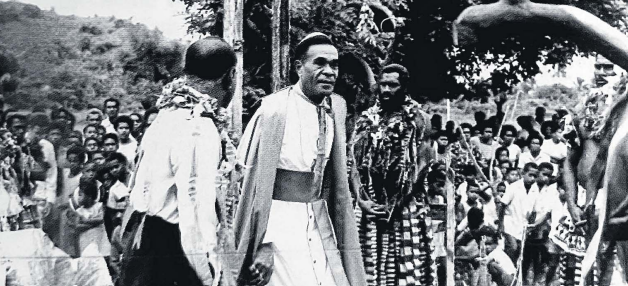In last week’s edition of The Fiji Times, we traced Father Frank Hoare’s connection with both iTaukei and Indo-Fijian communities, where he learnt the value of humility in ministry.
From confessions in Naililili to lessons from veteran priests and daily life in Koro and Nabala.
This week, Fr Hoare is still in Nacamaki Village on Koro Island where he is continuing his Fijian language immersion by living among the villagers.
Pilgrimage to Nabutautau
It’s June 27 and Fr Hoare joined Archbishop Petero Mataca, fellow priests, and 50 catechists on a pilgrimage through the highlands of Viti Levu to Nabutautau Village, believed by its residents to be cursed due to the ancestral killing of Methodist missionary Reverend.
“They invited Archbishop Mataca to come to their village to exorcise the evil,” Fr Hoare said.
“The archbishop decided to walk in pilgrimage from Vanuakula people making their way to Nabutautau Parish (where Columban, Fr John Mahoney was the parish priest) to Bemana (Where Marist Fr Chanel Cyr was parish priest).
“Fr Tom Rouse and I were just finishing our Fijian language course, and we were delighted to go along too.”
The journey from Vanuakula to Bemana, via Nabutautau, involved over 50 river crossings and a steep climb to the Nadrau plateau.
At one village, the archbishop formally retired an elder catechist with the presentation of a tabua (whale’s tooth), only to see him continue in his role out of habit.
Fr Hoare said the group camped in makeshift shelters and shared roasted eel and dalo.
Despite the cold and physical toll, they were warmly received in Nabutautau, where a Mass of blessing was held.
“After the welcoming rituals, we assisted at a solemn Mass and blessing of the village.
“Once dinner was over, a large group sat drinking yagona under the moon and the stars as Marist Fr Jim Johnston regaled us with his funny stories.
“Today we left for Namoli and the sacrament of Confirmation in Draubuta Village. But that’s another story.”
A mass of reconciliation
A few days later, Archbishop Mataca celebrated a Mass of Reconciliation in Nabutautau, bringing closure to the village’s historical burden.
As the group trekked toward Draubuta for confirmations, Fr Hoare fell ill and remained behind in Namoli.
Rejoining the group later in Bemana, Fr Hoare recounted a conversation with the archbishop, who shared a mysterious experience: sensing blood on his forehead during morning prayers, only to be struck later that day by a falling beam during the farewell ceremony.
“That afternoon after conferring Confirmation and blessing the house foundations he received the ritual thanks and farewell from the villagers under a temporary shelter.
“Without warning, a strong gust of wind lifted the sheets of roofing iron and dumped them sideways.
“Everyone dived for safety. As he jumped up, the Archbishop was struck on the forehead by a timber crossbeam.
“His forehead began to bleed. He realised then that his morning experience had been a warning of what was to come.”
The villagers interpreted the incident as the last act of defiance from the spirit that had haunted their community.
A lesson in Fijian politeness
Now back in Nacamaki Village on Koro Island, Fr Hoare continues his language training while adapting to local customs.
During a yaqona session in the early afternoon of 17 July, Fr Hoare attempted to sit informally with younger men, but the elders repeatedly invited him to sit at the front as a sign of respect.
“They are honouring me, but it often feels too formal.
“Today I sat down behind the bowl. The elders called me to sit up front.
“This time I thanked them and said that I was fine where I was.
“They continued to invite me up front. I continued to resist, repeating that I was fine. Eventually they gave up.”
Later, a young mother gently corrected him, explaining the proper way to navigate such situations, accept the honour first, then politely requested to move.
Grateful for her honesty, Fr Hoare acknowledged how such small moments reflect the deeper layers of Fijian cultural etiquette and the value of correction in ministry.



